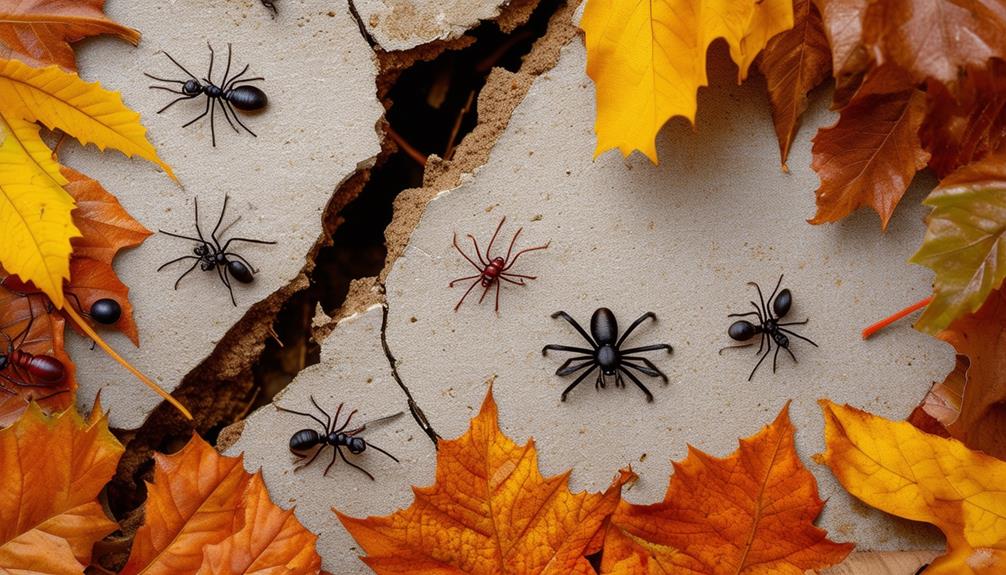Welcome to our informative article on mosquito control for your yard.
As summer approaches, it becomes essential to understand the factors affecting mosquito populations and the ideal time to start spraying.
Our experts will guide you through the recommended frequency of spraying to effectively control mosquitoes, ensuring a comfortable outdoor experience.
Additionally, we will provide valuable tips for preventing and controlling these pesky insects.
Stay tuned for expert advice and solutions to serve your mosquito control needs.
Key Takeaways
- Spray your yard every 2-3 weeks during peak mosquito season
- Regularly inspect your yard for potential breeding sites and remove standing water sources
- Start spraying early in the mosquito season before their population reaches its peak
- Use natural mosquito repellents like citronella or lavender oil and incorporate mosquito repellent plants into the landscape
Factors Affecting Mosquito Population in Your Yard
One of the key factors that can contribute to the proliferation of mosquitoes in your yard is the accumulation of standing water. Mosquitoes require water to breed, and stagnant water provides an ideal breeding ground for them. Factors impacting mosquito breeding include the presence of containers that collect rainwater, such as buckets, flower pots, and bird baths, as well as clogged gutters and low-lying areas in your yard where water tends to collect.
To control the mosquito population in your yard, it is important to eliminate these breeding sites. Regularly emptying and cleaning containers, ensuring proper drainage, and keeping your yard well-maintained can help prevent the accumulation of standing water.
Additionally, natural methods of mosquito control, such as planting mosquito-repellent plants like citronella or using mosquito dunks in ponds and other water features, can also be effective in reducing mosquito breeding.
Understanding the Life Cycle of Mosquitoes
Understanding the life cycle of mosquitoes is crucial in developing effective strategies for controlling their population in your yard.
Mosquitoes go through four stages in their life cycle: egg, larva, pupa, and adult.
The female mosquito lays her eggs in stagnant water, such as ponds, pools, or even containers with standing water.
These eggs hatch into larvae, which then develop into pupae.
After the pupal stage, adult mosquitoes emerge and start seeking a blood meal.
By understanding this life cycle, you can identify and eliminate mosquito breeding grounds in your yard.
Remove any standing water sources and use mosquito control measures such as larvicides or insecticides.
Regularly inspect your yard for potential breeding sites and take preventive measures to reduce the mosquito population, ultimately creating a safer and more enjoyable outdoor environment.
Determining the Ideal Time to Start Spraying
Determining the optimal timing for initiating mosquito spraying in your yard is essential for maximizing the effectiveness of pest control measures. To establish an ideal spraying schedule, it is crucial to consider the life cycle of mosquitoes and their peak activity periods.
The best time to spray your yard is typically in the late afternoon or early evening when mosquitoes are most active. This ensures that the insecticide has enough time to settle and provide protection throughout the night, when mosquitoes are known to be most bothersome.
Additionally, it is important to start spraying early in the mosquito season before their population reaches its peak.
Recommended Frequency of Spraying for Effective Mosquito Control
To ensure optimal mosquito control, it is essential to regularly and consistently spray your yard using an effective insecticide. Mosquitoes can quickly breed and multiply, posing a threat to the health and well-being of those in your community. By maintaining a regular spraying schedule, you can effectively reduce the mosquito population and minimize the risk of mosquito-borne diseases.
When it comes to the recommended frequency of spraying, it is advised to spray your yard every 2-3 weeks during the peak mosquito season. This interval allows for continuous protection against mosquitoes and helps to break their breeding cycle. However, it is important to note that the frequency may vary depending on the severity of the mosquito problem in your area.
In addition to regular spraying, there are other measures you can take to enhance mosquito control. Using natural mosquito repellents, such as citronella or lavender oil, can provide added protection without the use of harsh chemicals. Furthermore, removing any standing water sources in your yard, such as birdbaths or empty containers, is crucial. Mosquitoes lay their eggs in stagnant water, so eliminating these breeding grounds helps to decrease their population.
Additional Tips for Mosquito Prevention and Control
To effectively prevent and control mosquitoes, homeowners can implement a few additional tips alongside regular spraying and removal of standing water sources.
One effective method is to incorporate mosquito repellent plants into the landscape. These plants, such as citronella, lavender, and marigold, naturally repel mosquitoes and can be strategically placed around the yard.
Additionally, using natural mosquito control methods can be beneficial. For example, introducing mosquito-eating fish, like Gambusia or goldfish, into ornamental ponds or water features can help reduce mosquito populations.
Furthermore, installing mosquito netting around outdoor seating areas or using mosquito repellent candles can provide an extra layer of protection against these pesky insects.
Frequently Asked Questions
What Are Some Natural Remedies to Control Mosquitoes in My Yard?
Natural mosquito repellents and homemade mosquito traps are effective measures to control mosquitoes in your yard. These remedies, derived from natural ingredients, offer a safe and environmentally friendly solution to reduce mosquito populations without the need for frequent chemical spraying.
Can I Spray My Yard for Mosquitoes While It Is Raining?
Spraying your yard for mosquitoes during rain may have limited effectiveness as the rain can wash away the spray. Alternatives to spraying during rain include using mosquito-repelling plants, removing standing water, and using mosquito traps.
Is It Safe for Pets and Children to Be in the Yard After Spraying?
Before allowing pets and children back into the yard after spraying for mosquitoes, it is important to take safety precautions. Wait for the recommended time specified on the product label to ensure their safety.
What Is the Cost of Professional Mosquito Spraying Services?
When considering professional mosquito spraying services, it is important to compare costs and explore DIY options. Conducting a cost comparison analysis can help determine the most cost-effective solution for mosquito control in your yard.
Are There Any Specific Plants or Flowers That Can Help Repel Mosquitoes in My Yard?
Plants for mosquito control and natural mosquito repellents can be effective in repelling mosquitoes in your yard. Some examples include citronella, lavender, and marigolds. These plants emit scents that mosquitoes find unpleasant, reducing their presence in your outdoor space.





